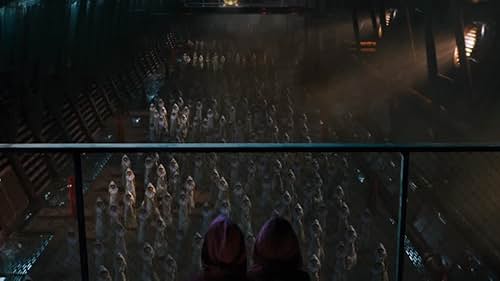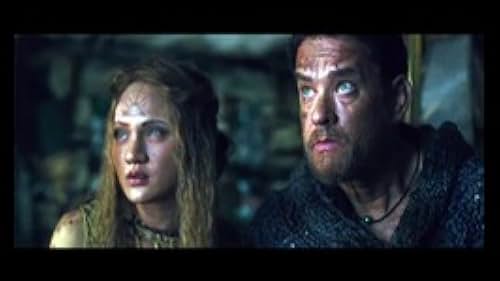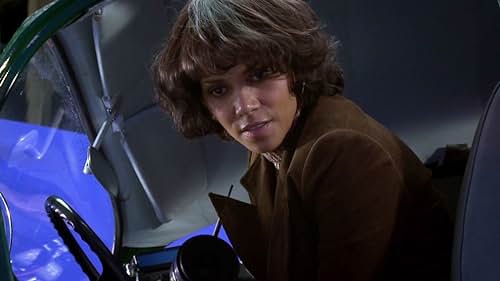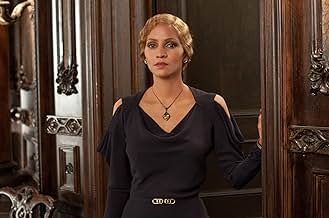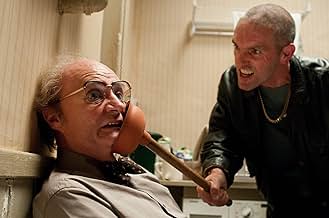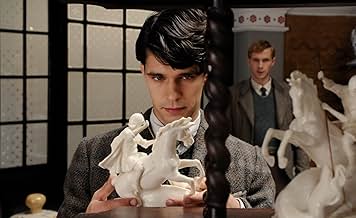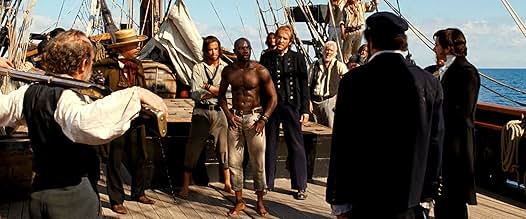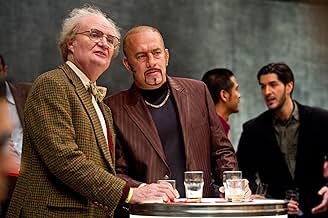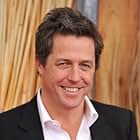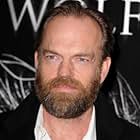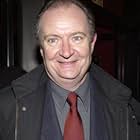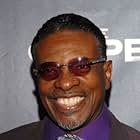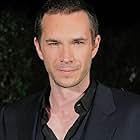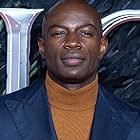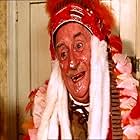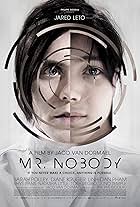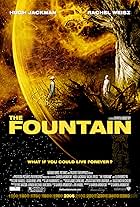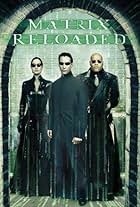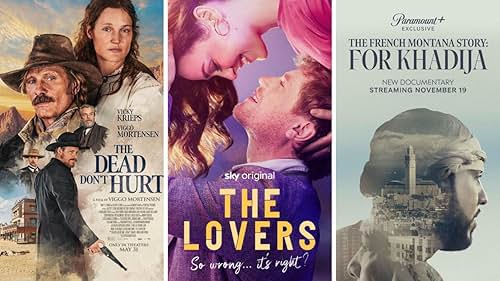Un'esplorazione di come le azioni di un singolo individuo riescano ad avere un impatto su altre vite nel passato, presente e futuroUn'esplorazione di come le azioni di un singolo individuo riescano ad avere un impatto su altre vite nel passato, presente e futuroUn'esplorazione di come le azioni di un singolo individuo riescano ad avere un impatto su altre vite nel passato, presente e futuro
- Premi
- 15 vittorie e 79 candidature
Brody Nicholas Lee
- Javier Gomez
- (as Brody Lee)
- …
Trama
Lo sapevi?
- QuizIn 2005, while on the London set of V per Vendetta (2005), Natalie Portman gave a copy of the original novel to Lana Wachowski, who became deeply interested in it. A year later, both Wachowski siblings wrote a first draft of the screenplay. Tom Tykwer, a friend of the Wachowskis, was invited to co-author several subsequent drafts with them in the following two years, constantly keeping in mind observations by the book's author himself, David Mitchell, while looking for international investors. In all those years, Portman was promised the role of Sonmi-451, but had to turn down the role at the last minute after becoming pregnant in 2010; however, she is given a special thanks in the closing credits.
- BlooperThe 1849 slave trade contract that Ewing was bringing back to his Father in the states was unenforceable. The slave trade had been outlawed in the United States on January 1, 1808, the first date permitted by the Constitution. The Act Prohibiting Importation of Slaves of 1807 (2 Stat. 426, enacted March 2, 1807). Slaves could no longer be imported into the United States. The slave trade was dead. Likewise, California was a "free state" where owning slaves was outlawed in 1849.
- Curiosità sui creditiWhen a montage is shown of all the characters the actors play, the font of the names changes with each time period.
- ConnessioniFeatured in The Tonight Show with Jay Leno: Episodio #21.21 (2012)
- Colonne sonoreLooking For Freedom
Music by Jack White
Lyrics by Gary Cowtan
Performed by David Hasselhoff
© by Radiomusic - International (50% for Germany/Austria/Switzerland) / Young Music Publishing (Remaining World)
Courtesy of Universal Music Publishing Group (Germany)
Mit Freundlicher Genehmigung von Sony Music Entertainment Germany GmbH
Courtesy of Sony Music Entertainment Germany GmbH
Recensione in evidenza
I never read the book, but was intrigued by this movie because I had heard the book was very good. I don't have as much time to read as I used to, so I watched it, sort of liked it but found it kind of tedious to get through due to all the jumping around from story to story. Seeing the different actors as different characters was more distracting than anything, and the film was paced too quickly allow the average viewer to pick up all the complexities and themes the author was likely trying to convey.
In the end, I found that it had a couple of good and original story- lines (particularly the Escape from the Nursing home plot, and the gay composer plot was good) but I found the other stories to be of the mostly bland and formulaic sort we've seen many times before (ie. guy finds out slavery is bad, investigative reporter uncovers a plot by an evil corporation, bladerunner/soilent green hybrid plot, and a fairly standard post-apocalyptic adventure story plot). While all of the story lines were entertaining, you never have enough time to become invested in each story or characters because the movie constantly jumped around between the six different plots. Yes, there are six different plots in this two and half hour movie, and therein lies there problem.
After having watched the movie, I looked up the plot of the book because I was curious to see how the author handled the story. According to Wikipedia, In the book:
"Each tale is revealed to be a story that is read (or observed) by the main character in the next. The first five stories are interrupted at a key moment. After the sixth story, the other five stories are returned to and closed, in reverse chronological order, and each ends with the main character reading or observing the chronologically previous work in the chain. Eventually, readers end where they started, with Adam Ewing in the nineteenth century South Pacific. Each story contains a document, movie or tradition that also appears in a previous story. It shows how history not only repeats itself, but also connects to people in all time periods and places."
For the life of me, I can't figure out why the directors didn't structure the movie this way. It would have worked far better. The audience would have been able to become more immersed in each story- line, and the connections between each plot would have been more apparent. As it stands, upon one viewing, it seems more like a mess that tries too hard to be clever. So then you might say "you have to watch it more than once to 'get it'". I don't want to have to watch a film more than once "get it". I paid close attention the first time. I'd rather spend my time doing something other than watching an average movie more than once. It's a sign of poor story telling if you make it so that you have to watch a film more than once in order to "get it".
This film could have been so much better if it was structured like the book and took its time to actually tell the stories and develop the characters. Instead it was paced like an action movie. I felt like I was watching Inception at times (another annoying film that you "had to watch more than once in order to 'get it'"). Perhaps it was structured this way due to a limited running time. But why even attempt to merge six completely different stories into a single movie in the first place? It would lend itself much better to a mini-series. Game of Thrones is the perfect example of a book adaptation that proved to be an immense success when told at a television show's pace. I feel like this movie would have benefited greatly if it was separated episodically like that.
Before you respond to this with elitist statements like: "I got it first watch, you're just too dumb to understand catch all the intricacies," or "the average viewer is a moron, that's why they need all the themes and messages spoon fed to them. This film treats the audience like it has intelligence and allows to viewer to draw their own conclusions." I just want to pre-emptively say "no you're wrong". The reason I think this film was a disappointment was precisely because it treated the audience like morons who just wanted to see fast paced action with no deep exploration of the themes or characters. It didn't give the audience a chance to think about any of the themes because it was too busy rapidly jumping between story-lines focusing more on action scenes rather than any sort character development. Supposedly the Tom Hanks soul goes through a whole redemption arc that I never caught because the film never actually focused on it. I haven't even read the book, yet, on first viewing, it felt like none of the major themes of the book were explored with any sort of depth. It's a shame because it seems like the book is a good one worth reading. I'm probably not going to read it now though since the movie spoiled the plots for me.
That being said, I would say this film is worth a redbox rental at least. It has some good acting and some nice cinematography and special effects. It looks very pretty. The action is also quite good, although I wish there was a little less focus on the action, and more of a focus on the philosophical themes and characters.
In the end, I found that it had a couple of good and original story- lines (particularly the Escape from the Nursing home plot, and the gay composer plot was good) but I found the other stories to be of the mostly bland and formulaic sort we've seen many times before (ie. guy finds out slavery is bad, investigative reporter uncovers a plot by an evil corporation, bladerunner/soilent green hybrid plot, and a fairly standard post-apocalyptic adventure story plot). While all of the story lines were entertaining, you never have enough time to become invested in each story or characters because the movie constantly jumped around between the six different plots. Yes, there are six different plots in this two and half hour movie, and therein lies there problem.
After having watched the movie, I looked up the plot of the book because I was curious to see how the author handled the story. According to Wikipedia, In the book:
"Each tale is revealed to be a story that is read (or observed) by the main character in the next. The first five stories are interrupted at a key moment. After the sixth story, the other five stories are returned to and closed, in reverse chronological order, and each ends with the main character reading or observing the chronologically previous work in the chain. Eventually, readers end where they started, with Adam Ewing in the nineteenth century South Pacific. Each story contains a document, movie or tradition that also appears in a previous story. It shows how history not only repeats itself, but also connects to people in all time periods and places."
For the life of me, I can't figure out why the directors didn't structure the movie this way. It would have worked far better. The audience would have been able to become more immersed in each story- line, and the connections between each plot would have been more apparent. As it stands, upon one viewing, it seems more like a mess that tries too hard to be clever. So then you might say "you have to watch it more than once to 'get it'". I don't want to have to watch a film more than once "get it". I paid close attention the first time. I'd rather spend my time doing something other than watching an average movie more than once. It's a sign of poor story telling if you make it so that you have to watch a film more than once in order to "get it".
This film could have been so much better if it was structured like the book and took its time to actually tell the stories and develop the characters. Instead it was paced like an action movie. I felt like I was watching Inception at times (another annoying film that you "had to watch more than once in order to 'get it'"). Perhaps it was structured this way due to a limited running time. But why even attempt to merge six completely different stories into a single movie in the first place? It would lend itself much better to a mini-series. Game of Thrones is the perfect example of a book adaptation that proved to be an immense success when told at a television show's pace. I feel like this movie would have benefited greatly if it was separated episodically like that.
Before you respond to this with elitist statements like: "I got it first watch, you're just too dumb to understand catch all the intricacies," or "the average viewer is a moron, that's why they need all the themes and messages spoon fed to them. This film treats the audience like it has intelligence and allows to viewer to draw their own conclusions." I just want to pre-emptively say "no you're wrong". The reason I think this film was a disappointment was precisely because it treated the audience like morons who just wanted to see fast paced action with no deep exploration of the themes or characters. It didn't give the audience a chance to think about any of the themes because it was too busy rapidly jumping between story-lines focusing more on action scenes rather than any sort character development. Supposedly the Tom Hanks soul goes through a whole redemption arc that I never caught because the film never actually focused on it. I haven't even read the book, yet, on first viewing, it felt like none of the major themes of the book were explored with any sort of depth. It's a shame because it seems like the book is a good one worth reading. I'm probably not going to read it now though since the movie spoiled the plots for me.
That being said, I would say this film is worth a redbox rental at least. It has some good acting and some nice cinematography and special effects. It looks very pretty. The action is also quite good, although I wish there was a little less focus on the action, and more of a focus on the philosophical themes and characters.
- DragoonKain
- 17 mag 2013
- Permalink
I più visti
Accedi per valutare e creare un elenco di titoli salvati per ottenere consigli personalizzati
Everything New on Paramount+ in November
Everything New on Paramount+ in November
Freshen up your Watchlist with the latest selection of streaming movies and TV shows coming to Paramount+ this month.
Dettagli
- Data di uscita
- Paesi di origine
- Siti ufficiali
- Lingue
- Celebre anche come
- Cloud Atlas - Tutto è connesso
- Luoghi delle riprese
- Aziende produttrici
- Vedi altri crediti dell’azienda su IMDbPro
Botteghino
- Budget
- 102.000.000 USD (previsto)
- Lordo Stati Uniti e Canada
- 27.108.272 USD
- Fine settimana di apertura Stati Uniti e Canada
- 9.612.247 USD
- 28 ott 2012
- Lordo in tutto il mondo
- 130.516.424 USD
- Tempo di esecuzione2 ore 52 minuti
- Colore
- Mix di suoni
- Proporzioni
- 2.39:1
Contribuisci a questa pagina
Suggerisci una modifica o aggiungi i contenuti mancanti


